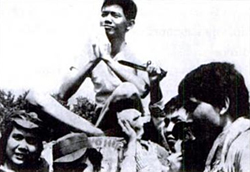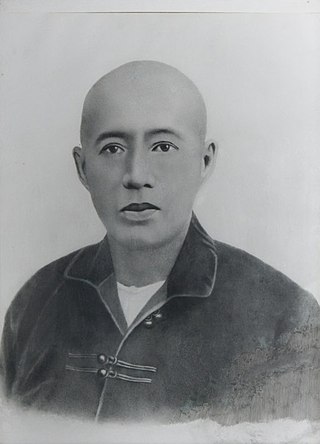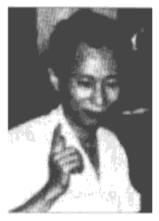
Soe Hok Gie was a Chinese Indonesian activist who opposed the successive dictatorships of Presidents Sukarno and Suharto.

Boven-Digoel, often simply called Digoel, was a Dutch concentration camp for political detainees operated in the Dutch East Indies from 1927 to 1947. The Dutch used it to detain thousands of Indonesians, most of whom were members of the Communist Party of Indonesia (PKI), Indonesian nationalists, and their families. It was located in a remote area on the banks of the river Digul, in what is now Boven Digoel Regency in South Papua, Indonesia. The camp was originally opened to exiled communists after the failed 1926 uprisings in Java and Sumatra; at its largest extent in 1930 it held around 1300 internees and 700 family members.

Kwee Tek Hoay was an Indonesian Malay-language writer of novels and drama, and a journalist.

Giri Tunggal Heroes' Cemetery is a cemetery in Semarang, Central Java. It contains the graves of military personnel and other persons deemed heroes by the Indonesian government, including the National Hero Albertus Soegijapranata. As of 2011 it has 1,843 interments.

Tio Ie Soei was a peranakan Chinese writer and journalist active in the Dutch East Indies and Indonesia. Born in the capital at Batavia, Tio entered journalism while still a teenager. By 1911 he had begun writing fiction, publishing Sie Po Giok – his first novel – that year. Over the next 50 years Tio wrote extensively in several newspapers and magazines, serving as an editor for some. He also wrote several novels and biographies, including ones on Tan Sie Tat and Lie Kim Hok.

Nio Joe Lan was a Chinese-Indonesian writer, journalist, and history teacher.
Tan Boen Soan was an ethnic Chinese Malay-language writer and journalist from Sukabumi, Java. He was the author of works such as Koetoekannja Boenga Srigading (1933), Bergerak (1935), Digdaja (1935) and Tjoban (1936). He later wrote for the Sunday Courier of Jakarta.
Loa Sek Hie Sia was a colonial Indonesian politician, parliamentarian and the founding Voorzitter or chairman of the controversial, ethnic-Chinese self-defense force Pao An Tui (1946–1949). He was a Peranakan of Chinese-Indonesian, Austrian and Javanese descent. In his political career, he campaigned against racial discrimination and demanded better healthcare and education for ethnic Chinese in the Dutch East Indies.

Lauw Giok Lan was a Chinese Indonesian journalist and writer. He was one of the founders of the newspaper Sin Po.

Lie Tjoe Hong, 3rd Majoor der Chinezen was a Chinese-Indonesian bureaucrat who served as the third Majoor der Chinezen, or Chinese headman, of Batavia, now Jakarta, capital of Indonesia. This was the most senior Chinese position in the colonial civil bureaucracy of the Dutch East Indies. As Majoor, Lie was also the Chairman of the Chinese Council of Batavia, the city's highest Chinese government body.

Tan Eng Hoa (陳英華) was born in Semarang and studied in the HBS. He graduated in law from the Rechts Hogeschool in Batavia in 1932. In 1945, he represented the Chinese Indonesians community in the Japanese-sponsored Investigating Committee for Preparatory Work for Independence, where he proposed an article for the freedom of association in the drafting of the Constitution of Indonesia. He died in April 1949 due to pancreatic cancer.

Hilman Djajadiningrat was an Indonesian aristocrat and politician.
Ko Kwat Tiong Sia (1896–1970), known as Mr. Ko Kwat Tiong and later Mohamad Saleh, was a prominent Indonesian politician, lawyer, civil servant and university lecturer. He was elected to the Volksraad in 1935 as a representative of the Partai Tionghoa Indonesia, and – after Independence in 1945 – headed the Balai Harta Peninggalan in Central Java until retiring in 1960.

Aliarcham (c.1901-1933) was a Sarekat Islam and Indonesian Communist Party party leader, activist and theoretician in the Dutch East Indies. He was a major figure behind the PKI's turn to more radical policies in the mid-1920s. He was arrested by Dutch authorities in 1925 and exiled to the Boven-Digoel concentration camp, where he died in 1933. He became a well-known Martyr, especially among Communists and Indonesian nationalists.

Injo Beng Goat was a Chinese Indonesian journalist, lawyer, and political activist of the late Dutch East Indies and early independence era in Indonesia. He was editor-in-chief of Keng Po, one of the largest newspapers of the early independence period, until 1958.
Phoa Tjoen Hoat, who also published under the name Th. H. Phoa Sr., was a Chinese Indonesian, Malay language journalist, translator and newspaper editor active in the Dutch East Indies in the early twentieth century.

Kho Tjoen Wan, sometimes spelled Kho Tjoen Gwan, was a Chinese Indonesian journalist, writer and political activist active mainly from the 1910s to the 1930s in the Dutch East Indies. He was involved with the Communist Party of Indonesia in the 1920s and may have been its first ethnically Chinese executive member.

Pouw Kioe An was a Peranakan Chinese journalist, novelist, newspaper editor and translator from the Dutch East Indies who was active from the 1920s to the 1950s. He worked for most of the main Chinese Indonesian newspapers in Java during that time and published original novels and translations prolifically.
Paiso was an Indonesian communist activist and political prisoner who was imprisoned by the Dutch in the Boven-Digoel concentration camp from 1927 to 1932. His son-in-law Manai Sophiaan (1915-2003) was an Indonesian diplomat and politician and his grandson Sophan Sophiaan (1944-2008) was an actor and politician.

Djokosoedjono, sometimes spelled Djoko Sudjono, was an Indonesian trade union leader, communist politician and former political prisoner. He was imprisoned by the Dutch in Boven-Digoel concentration camp from 1938 to 1943, by the Indonesian republic under Sukarno in 1948 and 1951, and by the Suharto regime from 1967 to his death in 1977. He was a parliamentarian in the Indonesian House of Representatives representing the Central All-Indonesian Workers Organization and then the Communist Party of Indonesia for most of the Liberal democracy and Guided democracy periods.















